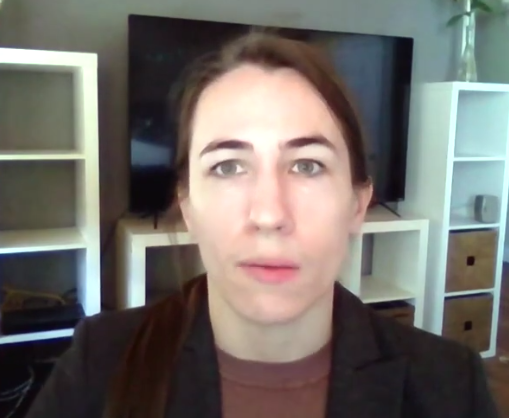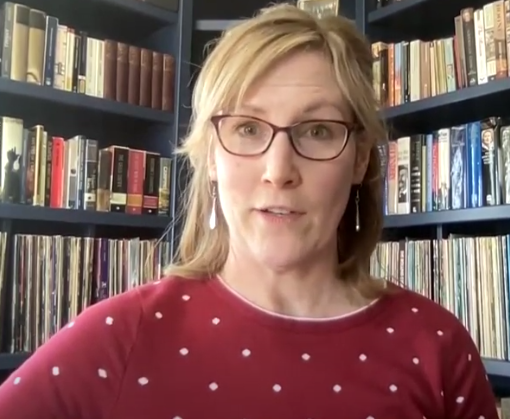Anna Brown, Research and Analysis Director with Citizens Count and host of the podcast “$100 Plus Mileage,” and Annmarie Timmins, Senior Reporter with the New Hampshire Bulletin, join The State We’re In host Melanie Plenda with an update on the latest bills before the Legislature.
Content Produced by NH PBS, a Member of
Content has been edited for length and clarity. Watch the full interview on NH PBS’s The State We’re In.
Melanie Plenda: Annmarie, let’s talk about HB 1604, a bill that would require state and county medical facilities to allow employees a conscientious objection exemption from a vaccine mandate.
Annmarie Timmins: This bill was doing pretty well in the house for a while. It looked like it may pass until lawmakers heard what it was going to cost the state and county nursing homes and state-run medical facilities. This bill would’ve required the existing exemptions to be considered and evaluated, which are medical and religious, and then this very undefined conscientious objection – I also call it the moral objection. It was anything, you didn’t really have to give a reason. You could just say, I have a moral objection to vaccines, any vaccines, and I would like to be exempted from it. We don’t have that right now. It’s also not allowed under Medicaid and Medicare rules, so that risks the state losing about 160 million for state-run facilities in that funding.
I think when lawmakers heard that, they really reconsidered it and now the bill sort of does put in place what we already have, which is you have to accept religious and medical exemption requests, and there’s different views on how those are being evaluated. Some employers will say, how do I evaluate someone’s religious convictions and granting them, and medical exemptions are the same, but there is disagreement still over how those should be considered. We’ll see about the Senate, whether those shall be granted or whether they can still be considered and rejected. Right now, 1604 is quite a bit less expansive than it was. I would say it’s been watered down and I think it’ll, it’ll get through House and Senate.
Melanie Plenda: Anna, you’ve also been following vaccination bills, especially House Bill 1210 requiring employers to offer conscientious objector exemption from vaccine mandates. What’s going on there?

Anna Brown: This bill affects public employers, private employers that receive any type of public funding, and post-secondary educational institutions. Employees and students would have to be allowed a right of conscientious exemption from any vaccine, not just the COVID 19 vaccine. Supporters say that this is a matter of personal choice and people should be able to make their own medical decisions. Opponents counter that this could create more public health issues since this is applying to all vaccines, not just the COVID 19 vaccine. As Annmarie discussed, there are concerns about how this could impact hospitals and nursing home employees. If they’re allowed to have this right to an exemption granted by their employer based on conscience or religion, they would just have to request the exemption and the employer would have to grant it. What sort of concerns might we have with other vaccines that haven’t been debated? This bill has passed the House and it’s had a public hearing in the Senate, but the final fate remains unclear. I also haven’t heard Governor Sununu weigh in yet on whether or not he would sign this bill, given that it could create problems public health-wise, but maybe also funding-wise if we’re looking at that for federal funding related to hospitals and healthcare facilities.
Melanie Plenda: Let’s also talk about HB 1379. This bill would require legislative oversight before the Department of Health and Human Services could require new vaccination for school attendance. Annmarie, can you talk to us a little bit about that?
Annmarie Timmins: Right now to attend school, you need to have some standard vaccine vaccinations; for polio, mumps, and measles, for example. If the state wanted to add anything to that they would need to have an oversight committee of lawmakers, and they would have to have three fifth approval from that committee to add another vaccine. If they did receive that approval, it would be good for 20 months. If they wanted to continue beyond that, it would require statutory change. The concern here is, what is the medical oversight of this committee? Is there going to be any medical expertise considered in this process? DHHS feel like it’s dangerous. They want be able to respond quickly to a change in public health and the Department is concerned that this would get in the way of that.
This was no doubt inspired in part by the COVID-19 vaccine, and the state has not recommended or proposed or said out loud that they would like to mandate the COVID-19 vaccine for school attendance but I think there’s some concern looking ahead that it may happen. Just in general, the pandemic has risen awareness and concern about all vaccines, which is why we’re seeing this legislation and other legislation go beyond just the COVID-19 vaccine. I think it’s going to be difficult for it to get through, but the DHHS is sounding the alarm about this. They’re really concerned about this one.
Melanie Plenda: Some of the more controversial bills this session have had to do with abortion. The House recently approved an exemption to its 24-week abortion ban for a fatal fetal anomaly. That was unexpected because it garnered enough Republican support to pass. What can you tell us about that, Annemarie, and what are the bill’s chances in the Senate?
Annmarie Timmins: I see this as a bill that has illustrated how people think the legislative process is supposed to work and hope it always works. There has been an effort since day one to get a number of exceptions added to this 24 week ban. There was hope that there would be an exemption for rape, for incest, and for fatal fetal anomalies, where a baby is not going to survive after delivery. Those have all failed. The Senate took those in groups and they also took them one by one and along party lines rejected all of them. One Republican did support the fatal fetal anomaly earlier in the session, that was Senator Aaron Hennessy of Littleton, but that one vote from the other side wasn’t enough.

The advocates for abortion access have continued the fight and Republicans have told me what’s been persuasive here is hearing from – to quote one Senator – the moms and the almost moms who have come forward and made clear that these were wanted babies and that they had to terminate very late in pregnancy because the baby was not going to survive. Maybe it didn’t have a brain, maybe its heart was not fully formed. There was pretty clear medical evidence that this baby was not going to survive. In some cases, women wanted to terminate early so that they would have a chance to hold that baby until it passed. In another case, a woman right now is carrying twins. One will not survive, and there’s a risk to terminating early, and there’s a risk to delivering by C-section early. She got up to that 24 weeks and eventually didn’t have the choice anymore. She has decided to terminate with C-section in 10 days but her point was, I want to make that decision.
We saw the Senate judiciary committee last week approve this five to nothing, which included all Republicans. That was a surprise, that was a change in position for them. It’ll go on House consent calendar tomorrow, which is where bills go. They think there will not be a challenge. I think it’s quite likely it will be pulled off consent and there will be a debate, but it looks likely that this is going to pass, and the governor has supported this along.
Melanie Plenda: There’s also a major housing bill, SB 400, that’s up for consideration in the Senate. Anna, what can you tell us about that?
Anna Brown: SB 400 did pass the Senate, but it’s still in House committee and faces an uncertain future on that side of the body. This is a huge housing bill; Governor Sununu gave it a shout-out in his State of the State address. It provides more planning and training materials to local officials related to zoning and development, it increases the eligibility for certain tax credits related to increasing housing stock and particularly workforce housing, and it establishes a “voluntary housing champion certification program for municipalities that promote workforce housing,’ and that would make those municipalities eligible for a first snatch at state infrastructure funds. What exactly that looks like will be determined by the state in the future.
Supporters say this is an incredibly important bill to address a critical housing shortage in New Hampshire that has been building for years. Opponents are concerned about local control and whether this is basically the state taking control of the zoning and development process that happens at the local level. I think that this bill faces an uncertain future because while there is so much momentum around the issue of housing and affordable housing in particular, virtually identical bill failed last year in the House, like HB 586. Even though Governor Sununu supports it, even though it pretty much sailed through the Senate, I’m going to be watching closely to see what happens in the House.
Melanie Plenda: Finally, let’s talk about redistricting. Anna, can you explain what that is? What’s the latest with the congressional proposal and the executive council?
Anna Brown: Redistricting is a process that happens after the 10 year census to make sure elected official districts are roughly the same size. You have a ton of people moving to a city on one side of the state, then suddenly you have to re-draw out the districts to make sure that equal numbers of people are in each district. With the congressional redistricting, there was a bit of a kerfuffle. The House and Senate passed a version of congressional redistricting that Governor Sununu said was no good. It’s really creating a Democratic safe district on one side of the state and a Republican safe district on the other side of the state. He proposed forward his own proposal that would make smaller changes to the current districts, keep them slightly more competitive than the plan that passed the House and Senate.
That is going to have a public hearing. We’ll see if that goes forward. If it doesn’t, this could end up in the courts and we’ll have to see what happens with the congressional districts there. The executive council is up for a vote at the House. At this point, it’s already passed the Senate. People are concerned that these maps were redrawn without enough public input, but the maps that they’re voting on do reshape the second district, which has been called a dragon. People say it snakes across the state. It covers the Western state all the way over to the seacoast. Governor Sununu supports the executive council redrawing because it addresses district two. Certain districts are definitely going to favor certain parties, have more voters from one party or another, but the population will be close between the districts.
 These articles are being shared by partners in The Granite State News Collaborative. For more information visit collaborativenh.org.
These articles are being shared by partners in The Granite State News Collaborative. For more information visit collaborativenh.org.







